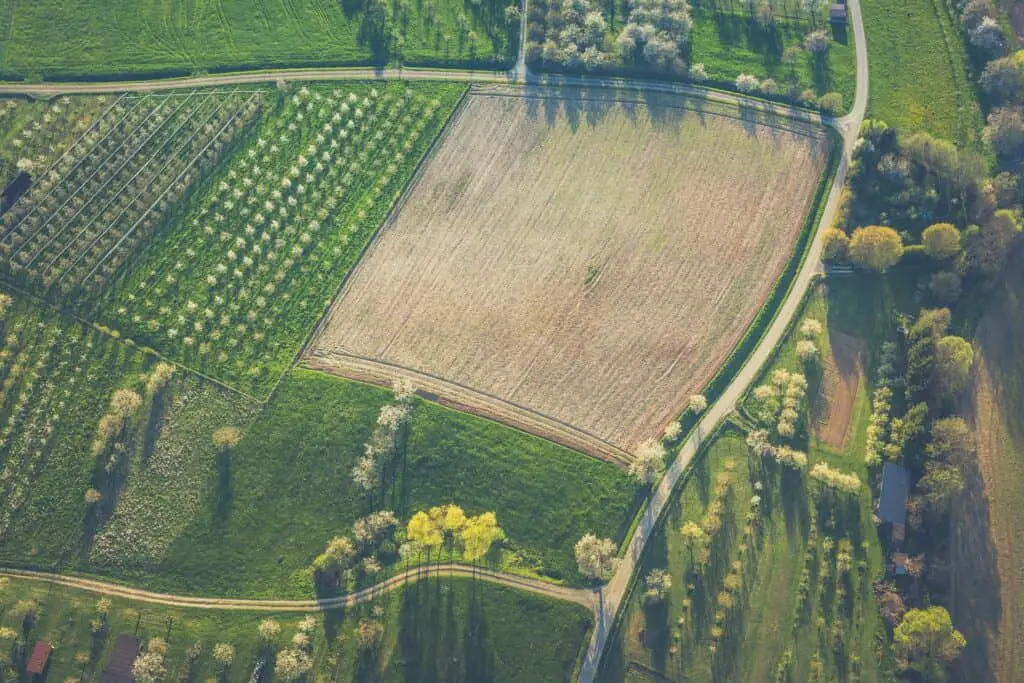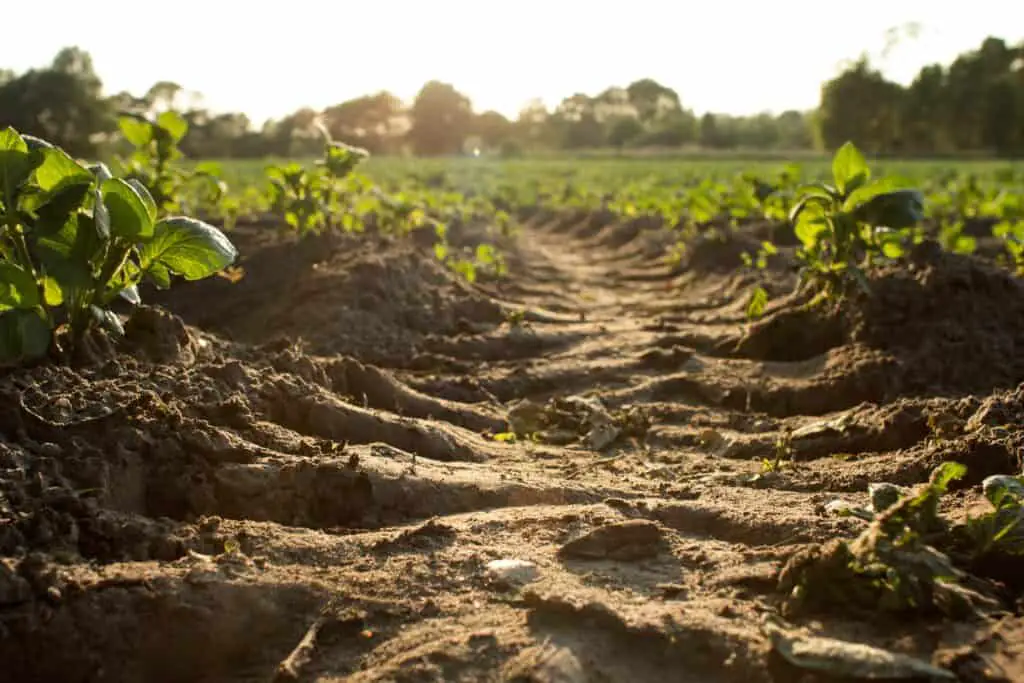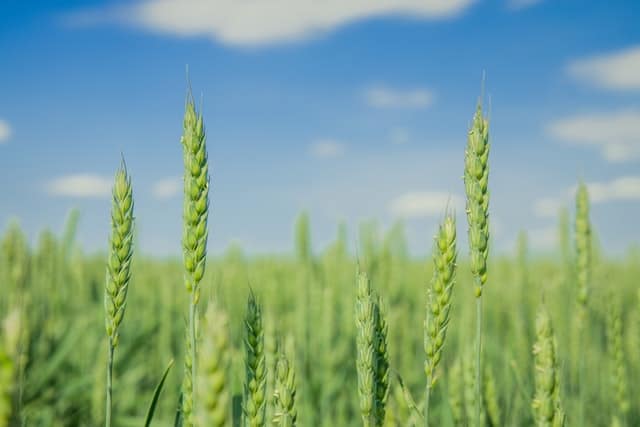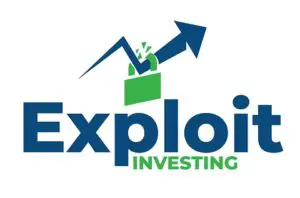
Investing in farmland directly can be complicated and requires the services of a real estate agent who is well-versed with the particulars of the land and the farming industry in general.
Farmland is considered commercial real estate and is a niche that deals with the buying and selling of arable land. Agricultural land can be bought and sold with the help of a real estate agent who can determine the value of the land based on its soil quality, location, and a few other factors.
In this article, I’ll expand on why buying farmland is a lucrative investment decision and how investing in a farm is similar to investing in commercial real estate. Depending on your skill level investing in farmland can be as easy as buying shares or running the entire operation.
Is a Farm Considered Real Estate?
Farms are considered real estate. As summarized by Investopedia, “real estate is any property comprising land along with the buildings on it and the natural resources of the land, including uncultivated flora and fauna, farmed crops and livestock, and water and mineral deposits.”
So if you’re considering putting a portion of your savings into real estate, farmland is a lucrative and safe investment option for a few reasons.
- Stable returns on investment. Compared to regular market commodities like gold, stocks, or bonds, farmland also provides a steady return on investment to the buyer. While the returns may be lower than traditional investment options, land value is a lot more stable with the potential to increase over time.
- Low market volatility. As mentioned in the previous point, the price of farmland tends to stay stable, with market fluctuations causing little change in land value.
- Effective hedge against inflation. Throughout time, the value of farmland has always kept up with inflation in the country, sometimes outpacing the rise in prices with a marginal increase in land value.This appreciation in value even during inflation makes investing in farmland an effective tool to preserve capital.
- Low correlation to market trends. The fluctuations in the value of farmland are independent of changes in conventional commodities, like shares or bonds, which are often affected by rising and falling market trends.
Ways To Invest in Farmland
Farmland has been an untapped asset in the real estate niche, primarily because most farms are owned by farmers, both retired and employed.
But the inherent value of owning farmland has drawn more investors to the potential returns on such an investment.
Owning a farm has always been profitable, but the high up-front cost deters most investors from buying farmland.
However, new opportunities have emerged in recent years allowing investors to put some of their money into farmland. Here are a few ways you can invest.
Direct Buying
The most obvious method is to purchase a few acres of farmland, just like you would buy any other real estate property. Farmland can be purchased and used in a variety of ways based on your resources and capabilities.
- Rentals. The most common option is to purchase farmland and rent it out to a new tenant, in most cases, a farmer. Renting out the land could lead to high returns if you find the right tenant with the skill to manage the farm and the resources to pay your rates.
- Sale-leaseback. This transaction is the simplest and most pursued form of farmland investment, requiring minimal effort from the investor. In a sale-leaseback transaction, existing land is bought and leased back to the farmer currently involved in the upkeep of the land. You may need to pay a higher price to acquire the farm, but it’s a low-risk, passive investment.
- Self-cultivation. If you plan to start your own farm and cultivate crops and livestock, this investment option is a more expensive and hands-on approach to owning a farm.
- Farm conversions. A farm conversion involves locating a piece of land that isn’t used for agriculture and converting it to a farm. In terms of value, a conversion has the potential of providing the highest rate of return as the land is usually cheaper, and profits are determined by the efforts of the investor.

Investing in Shares
Today, with the advent of REITs (Real Estate Investment Trusts), you can own a piece of farmland by investing in a few shares. These investments are available to anyone with a brokerage account and enough funds to buy one share.
Certain REITs may require a fixed minimum investment that must be locked in for a certain number of years before the profits become available.
REITs carry a higher risk than other forms of investment as the shares are traded on the stock market. But they also offer regular investors the chance to invest in farmland at a low cost.
Crowdfunding
Crowdfunding platforms give investors easy access to farmland in various ways, depending on how the forum is set up.
- Some crowdfunding platforms allow investors to buy shares in an LLC (limited liability company) that holds the legal title to the farmland.
- On some platforms, investors have the option of putting their money in agricultural facilities along with the land.
- In some cases, investors can choose to put their money directly into one farm or a fund that holds investments in several farms.
- Farmland LP, a crowdfunding platform, gives investors the chance to put their money in private equity funds, which are flexible and can be converted to REITs.
Crowdfunding platforms help diversify the investment options to potential buyers, allowing them to make decisions based on their resources. However, most platforms are only open to accredited investors (usually those with $1 million net worth or earning an income over $200,000 a year).
Comparison of Farmland and Commercial Real Estate
Farmland may seem like a foreign option to traditional real estate investors and often makes most people reluctant to invest. But the conventions associated with buying farmland are similar to those involved in purchasing real estate.
Equity and Debt Investment
Just like traditional real estate, farmland can be purchased as either an equity or a debt investment.
With an equity investment, you will receive a rental income from the revenue generated by the property along with a lump sum when the property is sold.
As a debt investment, farmland investors receive periodic payments in the form of interest.

Cap Rates
A cap rate is usually used to determine the level of risk of an investment. When an asset is less risky, the cap rate tends to be a lot lower.
For example, in commercial real estate, residential buildings and apartment complexes generally have lower cap rates as living spaces will always be required. Hence their value rarely drops too low, making them less risky investments.
Similarly, farmland used to grow primary crops, like soy, rice, wheat, and cotton, will have lower cap rates as these commodities are regularly farmed for human consumption. Higher cap rates are put in place on land which is used to grow exotic or imported crops.
Location and soil quality also play a crucial role in determining the cap rate of the farmland. In commercial real estate, land purchased near public transportation systems or populated areas tends to have higher cap rates.
Similarly, farms located in warmer climates and with better soil quality are highly valued and come with higher cap rates.
Additional Investments
Just like commercial real estate, farmland can use value-added investments to gain higher returns from the property. These add-ons can range from tiny constructional changes in an apartment to tearing down a residential complex to set up an office space.
The more significant, costlier investments generally take longer to execute but often translate to increased returns. Similarly, value-added investments can be made to farmland to increase yield and earn higher returns.
Increasing the space available for farming is an example of a small-scale investment that can be carried out with a small amount of funding. Repairing wells or optimizing irrigation systems are more complex modifications and require more substantial investment.
Substantial changes may include converting current orchards to accommodate a variety of crops or clearing out land space to plant trees and vines from scratch.
FAQs
- Are there restrictions to buying farmland? In the U.S., there are no restrictions on investors looking to purchase farmland.
- What’s the least complicated farmland investment? If you’re looking for a hands-off approach, crowdfunding and investing in REITs would be ideal. However, if you’re buying the land directly, the sale-leaseback option is optimal as the investor need not be involved in the upkeep of the farm.
- What’s the smallest amount needed to invest in farmland? If you invest in REITs, the minimum amount is often the price of a share being sold on the market. Crowdfunding platforms often mandate that investors purchase at least 10 shares (equivalent to one acre or 0.4 ha), which can be anywhere between $3000 and $8000. If you’re buying land directly, the investment is substantially more significant than the other two options.
Final Thoughts
To summarize, farmland is considered commercial real estate and shares many similarities with conventional real estate investments.
Whether you’re investing through REITs, crowdfunding, or direct buying, be sure to consult a financial advisor to make the most of your investment.
